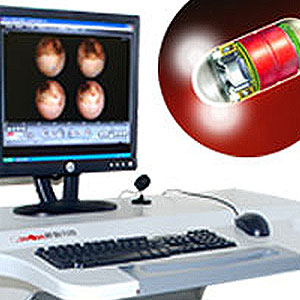
Capsule Endoscopy is a new era in the history of endoscopic technique. Capsule Endoscopy technique develops very fast, which begins from diagnosis of obscure gastrointestinal bleeding, to screening intestinal diseases. It can also make correct diagnosis and differential diagnosis for obscure abdominal pain, diarrhea, hemorrhage, anemia, and weight loss.
The whole capsule endoscopy system consists of three parts, including capsule/signal transmission, signal receiver/recorder and image workstation. Capsule Endoscopy can be used in gastrointestinal screening, but mainly in small intestine inspections. It can also be used in inspection of inflammatory bowel disease, parasite, vascular, congenital heteroplasia, and drug and radiation injury, especially small intestinal tumor. Small intestinal tumor accounts for 5% in gastrointestinal tumor. On the one hand, the incidence rate of this disease is comparatively low. On the other hand, it is concerned with the immaturity of the medical diagnosis method. Small intestinal diseases are detected mainly by Enteroclysis, but its positive rate of diagnosis is very low. CT scanning can also detect small intestinal tumor, and can detect primary tumor and metastasis, but the detection rate for small lesion and mucosal lesion in hollow organ is very limited.
With the development of Endoscopic technique, Endoscopic screening (Enteroscopy and capsule Endoscopy) has developed into the best diagnostic tool. There are some limitations on Enteroscopy, which belongs to invasive detection. The patient needs anesthesia before receiving detection and it also has disadvantages like expensive operating fee, low popularity, and poor patient compliance. With the application and emergence of capsule Endoscopy, the detection rates for small intestinal tumors have increased obviously. Compared with Enteroscopy, capsule Endoscopy has the advantages such as non-invasive, lower cost and the patient do not need anesthesia. Small intestinal tumors include small intestinal benign tumor and malignant tumor. The former one includes various kinds of polyps, adenoma, leiomyoma, lipoma, hemangiomas, hamartoma, lymphangiomyoma, neurofibromas, etc. The latter one includes gastrointestinal stromal tumors, adencarcinoma, neuroendocrine carcinoma (carcinoid and small cell neuroendocrine carcinoma), lymphoma etc. Capsule endoscopy provides significant basis on diagnosis and treatment for small intestinal tumors. Many malignant tumors such as melanoma, breast cancer, lung cancer, renal cell carcinoma, osteosarcoma, and germ cells cancer can also transfer to the small intestine. It should be paid more attention in clinical work. Capsule Endoscopy has a very wide range of applications in clinical work.



